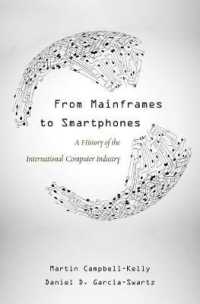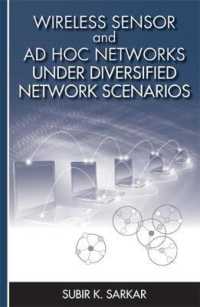- ホーム
- > 洋書
- > 英文書
- > History / World
Full Description
Historians working in the classical liberal tradition believe that individual decision-making and individual rights matter in the making of history. History written in the classical liberal tradition emerged largely in the nineteenth century, when the field of history was first professionalized in Europe and the Americas. Professional historical research was then imbued with liberal values, which included rigorous attention to the sources, historicist suspicion of an ultimate mover, an honest and dispassionate rational outlook, and humility towards what could be known. Above all, liberals wanted to chart the history of liberty, warn against threats to liberty, and defend it in an evolving political world. They believed history was real, and that it had lessons to teach, but that these lessons could not provide sufficient knowledge to predict the future or reorganize society around a central plan.
This book demonstrates how the classical liberal tradition in historical writing persists to this day, but how it is often neglected and due for renewal. The book contrasts the classical liberal view on history with conservative, progressive, Marxist, and post-modern views.
Each of the eleven chapters address a different historical topic, from the development of classical liberalism in nineteenth century America to the the history of civil liberties and civil rights that stemmed from this tradition. Authors give particular attention to the importance of social and economic analysis. Each contributor was chosen as an expert in their field to provide a historiographical overview of their subject, and to explain what the classical liberal contribution to this historiography has been and should be. Authors then provide guidance towards possible tools of analysis and related research topics that future historians working in the classical liberal tradition could take up.
The authors wish to call upon other historians to recognize the important contributions to historical understanding that have come and can be provided by the insights of classical liberalism.
Contents
Introduction, Michael J. Douma
Chapter 1: Beyond Laissez Faire and State Power: A Critical Look at the Transformation Thesis and Classical Liberalism in Nineteenth Century America, Scott Shubitz
Chapter 2: Classical Liberalism and the "New" History of American Capitalism, Phillip W. Magness
Chapter 3: The Historicity of Civil Liberties, a Liberal Predicament, Anthony Gregory
Chapter 4: Constituting Liberty: Toward a History and Science of Association, Lenore T. Ealy
Chapter 5: Some Roads Taken, and Not Taken, from the Progressive Era to the New Deal, David T. Beito
Chapter 6: A Manifesto for Liberty: Toward a New History of Civil Rights in US History, Jonathan Bean
Chapter 7: The End or Ends of Social History? The Reclamation of Old Fashioned Historicism in the Writing of Historical Narratives, Hans Eicholz
Chapter 8: History through a Classical Liberal Feminist Lens, Sarah Skwire
Chapter 9: Classical Liberalism in Eastern Europe: Very Vibrant but So Mild, Leonid Krasnozhon and Mykola Bunyk
Chapter








